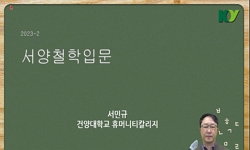The purpose of this paper is to present a ‘practical educational method’ that can be referenced from philosophers’ thoughts to identify the root of the problems of modern education and to improve them. By identifying the causes of problems in mo...
http://chineseinput.net/에서 pinyin(병음)방식으로 중국어를 변환할 수 있습니다.
변환된 중국어를 복사하여 사용하시면 됩니다.
- 中文 을 입력하시려면 zhongwen을 입력하시고 space를누르시면됩니다.
- 北京 을 입력하시려면 beijing을 입력하시고 space를 누르시면 됩니다.
https://www.riss.kr/link?id=T16023621
- 저자
-
발행사항
부천 : 가톨릭대학교 대학원, 2022
-
학위논문사항
학위논문(석사) -- 가톨릭대학교 대학원 , 철학과 서양철학전공 , 2022.2
-
발행연도
2022
-
작성언어
한국어
- 주제어
-
DDC
189 판사항(21)
-
발행국(도시)
경기도
-
기타서명
A practical study on 'Teaching' : focusing on the thoughts of Augustine and Thomas Aquinas
-
형태사항
123 p. : 삽화 ; 26 cm.
-
일반주기명
가톨릭대학교 (성심) 논문은 저작권에 의해 보호받습니다.
지도교수:박승찬
참고문헌 포함 -
UCI식별코드
I804:41027-200000594472
- 소장기관
-
0
상세조회 -
0
다운로드
부가정보
다국어 초록 (Multilingual Abstract)
The purpose of this paper is to present a ‘practical educational method’ that can be referenced from philosophers’ thoughts to identify the root of the problems of modern education and to improve them. By identifying the causes of problems in modern education, we will remind ourselves of the need to establish communication for the correct direction of dialogue, strengthen self-understanding, and strengthen the capacity for self-reflection. And it asks the question of whether the education system and society provide such an environment. In order to consider what modern education should aim for, this thesis aims to find a practical educational method that helps one to realize the meaning of life of the unique existence of ‘I’ as the subject of thought. First, we examine the direction of ideal education by analyzing the views of education of two philosophers, Augustine and Thomas Aquinas, who are penetrating the essence of education. They emphasize the importance of practical will in relation to the ability of human beings to seek changes in their own lives without relying on the fatalistic result that human life and purpose are determined. Accordingly, the essence of education should be aimed at a total change in life rather than securing the result of acquiring knowledge, and the teachings of the two philosophers who emphasize this will be helpful in finding modern educational methods.
Augustine emphasize the power of the soul, the rational substance that dominates the body in human, along with the fundamental question of human. Through the mental operation of the soul in the supreme position, the order of ends is reached and the epistemological ascent is directed towards the ultimate goal of ‘goodness’ and certainty of truth. This view of Augustine, which is based on trust in the inner human ability, is meaningful in that it can give justification for learner-centered education that can emphasize the learner’s will. Meanwhile, Thomas Aquinas develops his view of education based on Aristotle's view of the purpose of a happy life toward the supreme good under the harmony of faith and reason. His teaching follows an emphasis on the ‘activity’ of active intelligence based on an epistemological system. It is explained as a movement of ‘learning’, in which learners can acquire knowledge on their own, and a movement of ‘teaching’, which emphasizes the active role of the teacher as the actual state of having already acquired a study. It can be seen how the educational method that can acquire ‘knowledge from what you know to what you don’t know’ is applied in Thomas’s view of education in the same mode of movement as learner’s learning and teacher’s teaching.
Finally, we examine the problems of modern education and devise practical educational methods to improve them. In this way, we present a practical way to provide an educational platform for young people to resolve their concerns and reflections through correct communication and to strengthen their integrative thinking capabilities. In this regard, we analyze the principles of the educational program for training young people to ‘think for themselves’ and check how those principles are being applied in the actual educational field. Furthermore, the principles of the two philosophers’ view of education provide a strong theoretical foundation for the educational programs introduced above, and at the same time show that an important element of the practical philosophy of concreteness lies in the traditional philosophical discourse that can only stay in theory.
국문 초록 (Abstract)
본 논문은 현대 교육이 지니는 문제점의 근간을 파악하고 이를 개선하고자 철학자의 사상에서 참고할 수 있는 ‘실천적 교육 방법’을 제시하는 데 목적을 둔다. 현대 교육이 지닌 문제점의...
본 논문은 현대 교육이 지니는 문제점의 근간을 파악하고 이를 개선하고자 철학자의 사상에서 참고할 수 있는 ‘실천적 교육 방법’을 제시하는 데 목적을 둔다. 현대 교육이 지닌 문제점의 원인을 파악하여 올바른 대화의 방향성을 위한 소통 확립과 자기 이해, 그리고 자기성찰에 대한 역량을 강화할 필요성을 상기해본다. 그리고 이러한 환경을 교육 체계와 사회가 제공하고 있는가에 대한 물음을 던져본다. 현대 교육이 지향해야 할 바를 고찰하기 위해 본 논문에서는 사유의 주체로서 ‘나’라는 고유한 존재의 삶의 의미를 스스로 깨달을 수 있도록 도움 주는 실천적 교육 방법을 모색하는 데 목적을 둔다. 먼저 교육의 본질을 꿰뚫고 있는 두 철학자 아우구스티누스와 토마스 아퀴나스의 교육관을 분석함으로써 이상적인 교육의 방향성을 검토한다. 이들은 인간의 삶과 목적이 정해져 있다는 운명론적인 결과에 의지하지 않고서도, 인간 스스로 삶의 변화를 모색할 수 있음과 관계하는 실천적 의지의 중요성을 강조하고 있다. 이에 따라 교육의 본질은 지식 습득의 결과물 확보가 아닌 삶의 총체적 변화를 지향해야 하며, 이를 강조하는 두 철학자의 가르침은 현대적 교육 방안 모색에 도움이 될 것이다.
아우구스티누스는 인간에 대한 근본적인 물음과 함께 인간 안에서 육체를 지배하는 이성적 실체 즉 영혼의 능력을 강조한다. 최상의 자리에 있는 영혼의 정신작용을 통해 목적들의 질서에 도달하게 되며 진리의 확실성과 ‘선’이라는 궁극적 목적에 도달하는 인식론적 상승을 지향한다. 인간의 내적인 능력에 대한 신뢰를 기반으로 하는 아우구스티누스의 이러한 시각은 학습자의 의지를 강조할 수 있는 학습자 중심 교육에 대한 정당성을 부여할 수 있다는 점에서 의의를 지닌다. 한편 토마스 아퀴나스는 신앙과 이성의 조화 아래에서 아리스토텔레스의 최고로 좋음을 향하는 행복한 삶의 목적에 대한 견해를 토대로 그의 교육관을 전개한다. 그의 가르침은 인식론 체계에 기반한 능동지성의 ‘능동성’ 강조에 따라 학습자 스스로 지식을 습득할 수 있는 ‘배움’의 운동과 이미 학문을 습득한 현실태로서의 교사의 능동적 역할을 부각시키는 ‘가르침’이라는 하나의 운동으로 설명된다. 학습자의 배움과 교사의 가르침이라는 동일한 운동의 양태에서 ‘아는 것에서 모르는 것에로의 앎’을 획득할 수 있는 교육 방식이 토마스의 교육관에서 어떻게 적용되고 있는지 확인할 수 있다.
마지막으로 현대 교육이 지닌 문제점을 검토해보고 이를 개선할 수 있는 실천적 교육 방법을 고찰한다. 이로써 올바른 소통을 통해 청소년들이 그들의 고민과 성찰을 해소할 수 있는 교육의 장을 마련하고 통합적 사고 역량을 강화할 수 있는 실천적 방법을 제시한다. 이에 청소년들의 ‘스스로 생각하기’ 훈련을 위한 교육 프로그램의 원리를 분석하고 그 원리들이 실제 교육 현장에서 어떻게 접목되고 있는지 확인한다. 나아가 두 철학자의 교육관의 원리는 앞서 소개된 교육 프로그램에 강한 이론적 토대를 제공함과 동시에 이론에만 머무를 수 있는 전통적인 철학 담론에 구체성이라는 실천철학의 중요한 요소가 자리 잡고 있음을 보이고자 한다.
목차 (Table of Contents)
- 국문초록
- 1. 서론 1
- 2. 아우구스티누스의 ‘가르침’에 대한 이해 7
- 2.1 교육에 대한 부정적인 체험에서 드러나는 교육관 7
- 2.2 삶의 변화를 위한 진리 탐구 16
- 국문초록
- 1. 서론 1
- 2. 아우구스티누스의 ‘가르침’에 대한 이해 7
- 2.1 교육에 대한 부정적인 체험에서 드러나는 교육관 7
- 2.2 삶의 변화를 위한 진리 탐구 16
- 2.2.1 참된 인식과 관계하는 ‘정신’(mens)작용 16
- 2.2.2 궁극적 목적으로 인도하는 ‘지혜’(sapientia)의 길과 내면적 탐구 20
- 2.3 내면적 탐구를 향한 학습자의 의지 발현 29
- 2.3.1 학습자의 의지와 ‘탐구’ 29
- 2.3.2 내적인 교사와 인간 교사의 역할 35
- 3. 토마스 아퀴나스의 ‘가르침’에 대한 이해 43
- 3.1 인간적 행위에 대한 예비적 논의 44
- 3.1.1 의지와 작용, 숙고에 대하여 44
- 3.1.2 지성과 의지의 발휘로 나타나는 인간적 행위와 교육의 연관성 52
- 3.2 인식론에 기반한 가르침의 원리 및 구체적 방법 56
- 3.2.1 텍스트 분석을 통한 가르침의 가능성 논의 56
- 3.2.2 ‘지식의 선재하는 원리’와 능동지성의 역할에 따른 학습 63
- 3.2.3 ‘가르침’을 위한 ‘현실태’로서의 교사의 역할 68
- 3.3 ‘가르침’에 대한 고찰이 지닌 의의 75
- 4. 현대 교육의 변화를 위한 실천적 제언 82
- 4.1 문제점 진단을 위한 예비적 검토 82
- 4.2 현대 교육의 문제점 진단 86
- 4.3 현대 교육의 문제점 개선을 위한 실천적 제언 91
- 4.3.1 스스로 생각하기의 실천적 방법 – 인문상담 프로그램 ‘생각 사이-다’ 91
- 4.3.2 아우구스티누스와 토마스 아퀴나스의 교육관에 비추어 본 ‘생각 사이-다’ 101
- 5. 결론 114
- 참고문헌 119











